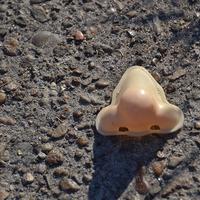
Nov 7, 2013
‘Tis the season for decorative gourds and warm apple cider. There’s a nip in the air and the earth smells like decaying leaves and wood smoke. Or does it?
Depending upon where you live, the change from summer to fall may be marked by the dropping of maple leaves or simply a drop in the smell of urine wafting up from subway grates. Back in 2012, we got a question from two Pittsburgh listeners, wondering why humans smell the change of seasons and why most people can agree on a set of scents as the presage of weather and time. Below is an edited excerpt of a conversation we had on the topic with Rachel Herz, an expert on the psychology of smell and author of the book, The Scent of Desire: Discovering Our Enigmatic Sense of Smell.
Radiolab: What are we smelling when we “smell” the seasons?
Rachel: Our sense of smell is unique because scents are invisible, and humans are predominantly visual creatures. So when we smell something, we are looking to our surroundings for an answer to, “What is it?” For instance, after a snowfall, the feeling of the cold air and the auditory change [of] greater quietness, along with a change in what we smell when we are outside versus inside, contribute to an emotional “sense” of snow that is more than just olfactory. “Smelling” winter is often a combination of festive smells, like spruce trees, and aromas that are evocative of holiday meals, like the smell of latkes sizzling or the smell of turkey and gravy.
But aren't there specific molecules that characterize any given smell, even "winter" or "fall"?
What we perceive via smell is molecules. But smell is much more arbitrary than just molecules. It’s not that smell is more than molecules -- it’s how the molecules are interpreted in their context. I did an experiment on this in my lab. I told one group of people a specific odorant was parmesan cheese. They sniff it and then evaluate how pleasant, intense, and familiar it is. After a week interval, I give the same group the same smell and say, “This is vomit.” People sniffed it and shrank back. They said, “That’s disgusting.” They wouldn’t believe it was the same smell they had smelled the week before and liked.
Many smells also have a feel to them. For example, peppermint feels cool, but that cool feeling is not olfactory, it’s trigeminal [the nerve relating to the feeling of the face and mouth]. Nevertheless, the experiences fuse together and come from the nose and both sensations make up the sensory experience of peppermint.
So our environment creates olfactory distortions...
Right. Scent is a confluence of what we are seeing, hearing, and feeling, emotionally and physically. For example, New York has a great smell landscape. When I’m walking in the Upper West Side I notice subway smells -- a combination of diesel, dust, smoke and urine -- and I love that smell. But I can guarantee you that I would hate that smell in my lab. It may not even register that, “Oh, that’s New York.”
Does the changing weather affect our sense of smell?
Temperature has a big effect on aromatic stimulus. Spring and summer are typically hotter and have more “odorific” humidity levels. The warmer and more humid it is, the more molecules of odors are in the air [and] the more they move; therefore the more volatile they are -- things have a greater smell intensity and we can smell more stuff. In cold air, there are fewer volatile molecules so we smell less. For example, to me, New York in the summer smells like urine mixing with smoky pretzels, hot dogs, and car exhaust. But if it’s 20 degrees colder, I perceive a difference in the intensity of those smells because the air is less humid. Day in, day out, we smell the same things, then we wake up one morning, and it smells like "fall" now. The temperature and humidity has dropped and the city smells less intense. [In a way], we are more change detectors than anything else.
So does my fall smell different from your fall?
Well, we are both from the same region [of Northeast U.S.], so we can still agree that, yes, this is fall because we detect the same changes in the environment and have learned the smell signal “fall.” In my suburban area, it can smell like dead leaves or burning leaves, decaying plant life, wood smoke from people building fires, things like that. But each person has a unique nose. We each have between 350 to 400 olfactory receptors, but what those receptors can express varies. Say we both have the specific receptors to respond to a rose. Even if we perceive it at the same intensity, its quality can be different -- it depends upon the meaning we’ve assigned to it.
There are some people who call themselves folk forecasters, who can sense how mild or harsh a season will be based on smell and visual cues, what do you think about this?
I’m not sure how accurate these people are at forecasting but, again, I would say this is just associative learning: people who have lived in a given environment for a long period of time are able to take in a lot of information and integrate it with past experiences.
What does fall smell like to you?
It’s so hard, even given training, to pinpoint a smell. I’d need to be in the moment to give my “wine description” of a season. I’ll call you up as soon as I smell fall.
